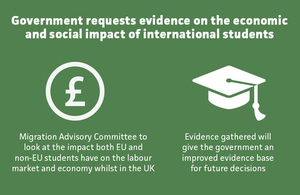Government to commission assessment of international students
Home Secretary to ask Migration Advisory Committee to complete detailed study of impact of international students in the UK.

Government requests evidence on the economic and social impact of international students
The government will today commission its independent advisers on migration to complete a detailed assessment of the social and economic impact of international students in the UK.
The commission is part of a series of publications coming out today which will feed into a robust and comprehensive evidence base on the impact of international students.
Alongside the commission, the UK’s first publication of exit checks data will provide a comprehensive account of the compliance of international students. In addition, the Office of National Statistics is releasing a report as part of its ongoing programme of work looking at the impact of students on net migration.
Taking action
The government has been clear that it is committed to keeping the doors open to genuine students, while at the same time taking action to crack down on immigration abuse from poor quality institutions that were damaging the UK’s reputation as a provider of world-leading education. Since 2010, this has included taking away the ability of more than 900 – often bogus or low quality – colleges to bring in international students.
The Migration Advisory Committee (MAC) will be asked to examine the impact both EU and non-EU students have on the labour market and economy whilst in the UK.
Issues the MAC will be asked to consider will include:
- the impact of tuition fees and other spending by international students on the national, regional, and local economy and on the education sector
- the role students play in contributing to local economic growth
- the impact their recruitment has on the provision and quality of education provided to domestic students
Home Secretary Amber Rudd said:
There is no limit to the number of genuine international students who can come to the UK to study and the fact that we remain the second most popular global destination for those seeking higher education is something to be proud of.
We understand how important students from around the world are to our higher education sector, which is a key export for our country, and that’s why we want to have a robust and independent evidence base of their value and the impact they have.
Popular destination
The UK is the second most popular destination for international students, with 4 UK universities in the world’s top 10, 16 in the top 100 and international student satisfaction in the UK at 91 per cent for undergraduates.
Last year the UK saw an increase of 6 per cent in visa applications for Russell Group universities while visa applications sponsored by universities are 17 per cent higher than they were in 2010.
This has driven in part by an effective and user-friendly visa system which sees 99 per cent of entry clearance applications decided within the target of 15 days and the grant rate for Tier 4 (General) visa entry clearance applications having increased every year since 2010, with 96 per cent of applications granted in 2016.
Immigration Minister Brandon Lewis said:
We have always been clear that our commitment to reducing net migration to sustainable levels does not detract from our determination to attract international students from around the world.
Since 2010 we have clamped down on abuse, while increasing the number of genuine students that come to the UK from around the world.
The MAC, which comprises of a group of internationally recognised experts in their field, is responsible for providing transparent, independent and evidence-based advice to the government on migration issues. They have been asked to report back by September 2018.